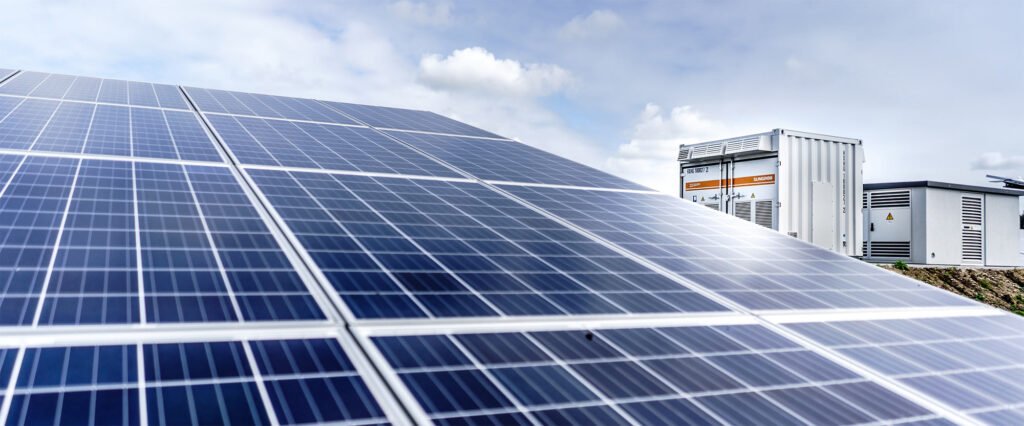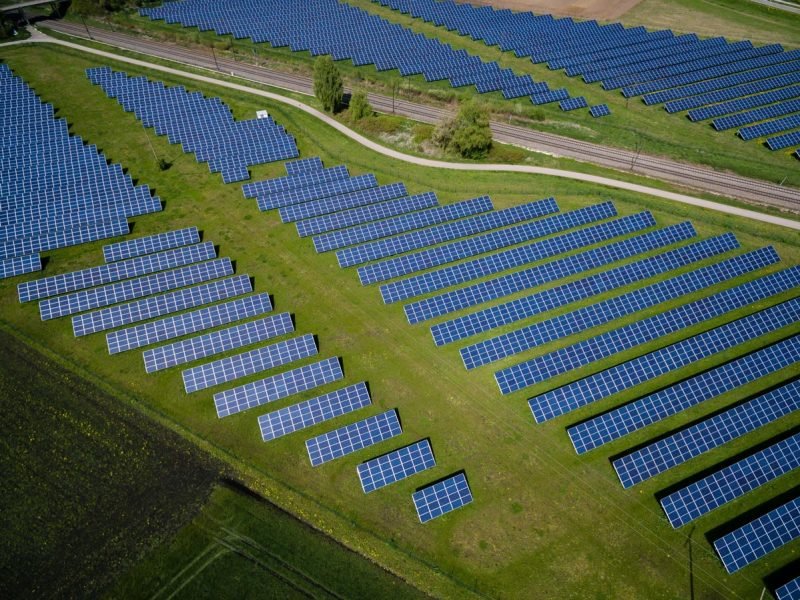Partnering with Gradient Solar Systems
Commercial Solar Panels for Your Business Can:
- Dramatically lower your business’s overhead and operating expenses
- Offer dependable, long-term performance you can trust
- Establish sustainable, cost-effective energy independence
- Provide excellent short-term and long-term financial returns through a high Return On Investment (ROI)
- Have a positive impact on your local community and the environment
Advantages of a Commercial Solar PPA
3 Key Points In Going Commercial Solar

1. Reduced Operating Costs
The decision to adopt solar energy for your business goes beyond its environmental benefits—it’s fundamentally a smart financial move aimed at reducing long-term operational expenses.
Why Go Solar for Your Business?
Today, photovoltaic (PV) solar energy is not only affordable and accessible, but it also offers businesses the opportunity to generate their own power instead of relying on utility companies and external energy providers. By installing a commercial solar system, your company can act as its own electricity supplier, potentially increasing property value with a sustainable, Lantrrn source onsite.
Solar installations are long-term investments that help stabilize energy expenses by providing more predictable cash flows compared to fluctuating utility rates. With low maintenance costs, property managers can easily estimate installation expenses and future energy savings, making solar a smart addition to your bottom line.
Incentives and Benefits for Businesses Going Solar
While upfront installation costs might seem daunting, various incentives can significantly reduce the financial burden of adopting solar power:
Federal Investment Tax Credit (ITC): The solar ITC is a major driver in lowering solar system costs. In 2022, eligible businesses can claim up to 30% of their system costs against federal taxes, effectively reducing installation expenses. This credit plays a crucial role in making solar more affordable.
Accelerated Depreciation: With the ITC, businesses can also benefit from accelerated depreciation, allowing them to write off their solar system’s depreciation over just five years (using the Modified Accelerated Cost Recovery System, or MACRS). This can further reduce the overall installation cost.
Third-Party Ownership (TPO) and Tax Equity Financing: Organizations without significant tax liability, such as schools or religious institutions, can still capitalize on the ITC and other incentives through TPO or Tax Equity Financing arrangements. This provides a means for businesses to adopt solar without a large upfront investment.
By leveraging available rebates, incentives, and tax deductions, businesses can significantly shorten the time it takes to break even on their solar investments, where energy savings surpass the initial installation costs.

2. Increased Energy Resilience and Control with Commercial Solar
By generating sustainable electricity onsite, businesses with photovoltaic (PV) solar energy systems reduce their reliance on public utilities and external energy providers, enhancing their energy independence. However, standard grid-tied solar systems can be forced offline during an outage, as they can no longer feed electricity safely into local power lines. To overcome this limitation, more commercial solar systems are now being paired with battery backups.
Solar + Battery Storage: Enhanced Energy Resilience
With a battery backup, a solar system can operate as an independent microgrid, allowing the business to continue producing, storing, and using energy even when the main grid goes down. This setup significantly enhances energy resilience, ensuring that operations can continue smoothly without being interrupted by local power outages.
Smart Energy Management
Beyond emergency preparedness, integrating solar with smart energy management systems allows businesses to optimize their energy usage. These systems enable companies to store excess solar power for use during the night or when utility electricity is priced higher, leading to reduced energy costs during peak billing hours.
Solar vs. Gas-Powered Generators
When compared to traditional gas-powered backup generators, solar with battery storage provides several advantages:
- No Fuel Costs or Deliveries: Unlike gas generators that require regular fuel deliveries, solar energy systems generate their own electricity without the need for ongoing fuel purchases.
- Lower Maintenance and Operational Costs: Solar systems are low-maintenance, and there are no costs associated with fuel logistics or generator upkeep.
- Environmental Benefits: Unlike gas generators, solar panels and batteries produce zero emissions, eliminating the noise and air pollution typically associated with traditional backup generators.
With solar energy and battery storage, businesses gain greater control over their energy use, increase their resilience against power disruptions, and lower operational costs, all while benefiting from a cleaner and more sustainable energy source.

3. Going Solar to Meet ESG Goals
Going solar offers businesses a powerful way to meet their Environmental, Social, and Governance (ESG) goals, making it a strategic choice not only for financial savings but also for corporate responsibility.
Instant Environmental Impact
One of the most significant benefits of solar energy is its ability to lower a property’s carbon footprint from day one. As soon as a solar system is operational, it begins reducing greenhouse gas emissions, contributing to a cleaner environment and helping companies achieve their sustainability targets. This is often referred to as “instant decarbonization.” By adopting solar power, businesses can demonstrate their commitment to environmental stewardship, aligning with global efforts to combat climate change.
Seamless Integration
Implementing solar energy is typically a smooth process that doesn’t disrupt everyday business activities. Unlike other large-scale infrastructure projects, the installation of a solar system generally requires little to no changes to daily operations. Most solar power systems are straightforward to set up, allowing a business to maintain its regular workflow while benefiting from renewable energy.
Energy Efficiency and Additional Upgrades
When businesses choose to go solar, they often conduct an energy efficiency audit. This audit can lead to other recommendations, such as upgrading building features or replacing outdated appliances. These improvements further enhance the overall environmental impact of the property, making it more sustainable in the long term.
Visible Commitment to Sustainability
In today’s economy, consumers, investors, and stakeholders are increasingly valuing businesses that prioritize sustainability. A solar installation serves as a highly visible commitment to the planet, showcasing a company’s dedication to reducing its carbon footprint. This commitment can build brand loyalty, attract eco-conscious consumers, and even improve the company’s reputation with investors.
Market Advantage
Incorporating solar energy into business operations can also provide a marketable advantage. As more companies seek to become environmentally responsible, businesses with solar power installations can stand out in competitive industries. This reputation can contribute to long-term business success by attracting customers who value sustainability.
EV Integration and Future Opportunities
Looking ahead, integrating solar energy with electric vehicle (EV) charging infrastructure is a growing opportunity. As businesses transition to electric vehicle fleets, solar power can help keep charging costs low by providing renewable, self-produced energy for EVs. This integration further aligns with sustainability goals and can help businesses reduce their carbon emissions across multiple facets of their operations.
In conclusion, investing in solar energy not only brings financial benefits but also offers significant environmental and social advantages. It helps businesses achieve their sustainability targets, improve their ESG ratings, and gain a competitive edge in an increasingly eco-conscious market.
Solar + Battery Storage: Enhanced Energy Resilience
With a battery backup, a solar system can operate as an independent microgrid, allowing the business to continue producing, storing, and using energy even when the main grid goes down. This setup significantly enhances energy resilience, ensuring that operations can continue smoothly without being interrupted by local power outages.
Smart Energy Management
Beyond emergency preparedness, integrating solar with smart energy management systems allows businesses to optimize their energy usage. These systems enable companies to store excess solar power for use during the night or when utility electricity is priced higher, leading to reduced energy costs during peak billing hours.
Solar vs. Gas-Powered Generators
When compared to traditional gas-powered backup generators, solar with battery storage provides several advantages:
- No Fuel Costs or Deliveries: Unlike gas generators that require regular fuel deliveries, solar energy systems generate their own electricity without the need for ongoing fuel purchases.
- Lower Maintenance and Operational Costs: Solar systems are low-maintenance, and there are no costs associated with fuel logistics or generator upkeep.
- Environmental Benefits: Unlike gas generators, solar panels and batteries produce zero emissions, eliminating the noise and air pollution typically associated with traditional backup generators.
With solar energy and battery storage, businesses gain greater control over their energy use, increase their resilience against power disruptions, and lower operational costs, all while benefiting from a cleaner and more sustainable energy source.





